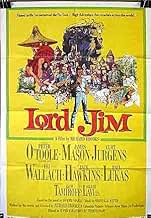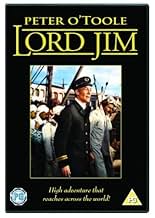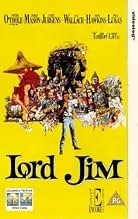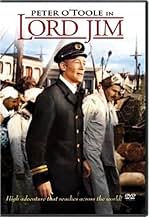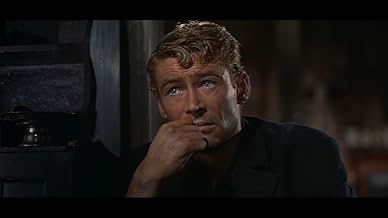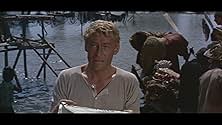IMDb RATING
6.7/10
4.5K
YOUR RATING
After being discredited as a coward, a 19th century seaman lives for only one purpose: to redeem himself.After being discredited as a coward, a 19th century seaman lives for only one purpose: to redeem himself.After being discredited as a coward, a 19th century seaman lives for only one purpose: to redeem himself.
- Nominated for 2 BAFTA Awards
- 2 nominations total
Curd Jürgens
- Cornelius
- (as Curt Jurgens)
Jûzô Itami
- Waris
- (as Ichizo Itami)
Rafiq Anwar
- Moslem Leader
- (as Rafik Anwar)
- Director
- Writers
- All cast & crew
- Production, box office & more at IMDbPro
Featured reviews
Peter O'Tooles eyes are disturbingly blue. Lots of visual detail, good cinematography, cheap special effects. It moves slowly and doesn't really explain the motivations of the main character very well. O'Toole is good but oblique. The movie doesn't really pick up until Eli Wallach shows up. He is quite good, cheerfully cruel and sadistic, and I think he may have taken things from this role that he later expanded on in The Good, The Bad and The Ugly. Curt Jurgens is delightfully seedy, a sweaty and cowardly drunk who needs a haircut. I don't know anything about the rating system here but I'm giving it a seven for just for watchability.
I have seen the film three times over the past thirty years and each time I loved it. The subject of the film must have attracted director Richard Brooks who was essentially a screenplay writer who later became a director. He knew the merits of a strong script with philosophical lines from Conrad. Coppola was to use the related original material (Conrad's) in his "Apocalypse Now" for the Brando scenes several decades after this film was made and mostly forgotten.
What Brooks does not realize is that lines like "it only takes a split second to make a coward a hero or turn a hero into a coward" and "every sinner wants a second chance at redemption, without realizing he is damned for ever" are philosophical lines that one expects to hear from very literate individuals. Here, in "Lord Jim," the lines are often spoken by the dregs of society. Jim, of course, we are told by the narrator (Jack Hawkins' Marlowe) was philosophical, dreamed of heroism, and was a gentleman.
The film is made up of three distinct segments: 1. the "sinking" of SS Patna 2. The liberation of Patusan ("Patna" + "us" make up the name Patusan, remarks Jim to his love) and 3. The battle with a group of scoundrels (led by James Mason's 'Gentleman' Brown) with some fine speeches on honor, death, and fear.
Each segment could stand alone but together the film adds considerable worthiness that exceeds the action and plot, the elements that most viewers use to judge a movie. The lesser characters in the film add color and counterpoints to the script. Christian Marquand's French Captain who defends Jim's "cowardice" with the words "fear can make us do strange things" or Paul Lukas' Stern who compares his dead butterfly collection with the "wonderful, perfect human beings that God created" or the native who wonders why some pray to one god instead of a host of Gods are a few examples of dialogs that force you to reflect on what you heard.
The film's subject covers several religions. The fervent Muslims on the way to Haj survive the storm. The Christian Jim prays to his God. The Buddhists pray to Buddha. And the natives pray to their array of gods (a touch of Hinduism?). Yet, the film is not a religious film. But faith in God is underlined at every stage.
Conrad was Polish and a seaman before he became a writer. Brooks is an American. O'Toole leads a cast that is predominantly British. Daliah Lavi is Israeli, Marquand is French, Jurgens is German...The film is truly international.
Brooks not only wrote and directed the film but this was the first film that he produced. The film proved to be ideal for O'Toole reprising his roles of "Lawrence of Arabia" and "Becket", roles that draw thin lines between cowardice and heroism and consequent attempts to redeem oneself. The film is not great cinema--but will remain for me cinema based on related major literary works ("Lord Jim" and "Heart of Darkness", both narrated by the fictional Marlow) adapted for the screen with some delightful performances from O'Toole, Mason, Wallach, and Marquand and commendable photography by Freddie Young.
What Brooks does not realize is that lines like "it only takes a split second to make a coward a hero or turn a hero into a coward" and "every sinner wants a second chance at redemption, without realizing he is damned for ever" are philosophical lines that one expects to hear from very literate individuals. Here, in "Lord Jim," the lines are often spoken by the dregs of society. Jim, of course, we are told by the narrator (Jack Hawkins' Marlowe) was philosophical, dreamed of heroism, and was a gentleman.
The film is made up of three distinct segments: 1. the "sinking" of SS Patna 2. The liberation of Patusan ("Patna" + "us" make up the name Patusan, remarks Jim to his love) and 3. The battle with a group of scoundrels (led by James Mason's 'Gentleman' Brown) with some fine speeches on honor, death, and fear.
Each segment could stand alone but together the film adds considerable worthiness that exceeds the action and plot, the elements that most viewers use to judge a movie. The lesser characters in the film add color and counterpoints to the script. Christian Marquand's French Captain who defends Jim's "cowardice" with the words "fear can make us do strange things" or Paul Lukas' Stern who compares his dead butterfly collection with the "wonderful, perfect human beings that God created" or the native who wonders why some pray to one god instead of a host of Gods are a few examples of dialogs that force you to reflect on what you heard.
The film's subject covers several religions. The fervent Muslims on the way to Haj survive the storm. The Christian Jim prays to his God. The Buddhists pray to Buddha. And the natives pray to their array of gods (a touch of Hinduism?). Yet, the film is not a religious film. But faith in God is underlined at every stage.
Conrad was Polish and a seaman before he became a writer. Brooks is an American. O'Toole leads a cast that is predominantly British. Daliah Lavi is Israeli, Marquand is French, Jurgens is German...The film is truly international.
Brooks not only wrote and directed the film but this was the first film that he produced. The film proved to be ideal for O'Toole reprising his roles of "Lawrence of Arabia" and "Becket", roles that draw thin lines between cowardice and heroism and consequent attempts to redeem oneself. The film is not great cinema--but will remain for me cinema based on related major literary works ("Lord Jim" and "Heart of Darkness", both narrated by the fictional Marlow) adapted for the screen with some delightful performances from O'Toole, Mason, Wallach, and Marquand and commendable photography by Freddie Young.
Lord Jim is one of those great works of fiction that is best watched after having read the novel, or at least a solid summary of the book. Without this background, the movie could be hard to understand. I also found that it was helpful to watch the film twice. Since some of the details of the movie do not square with those of the novel, it was a bit confusing at times to follow the sequence of the movie, and a second viewing brought all of that into focus. In my opinion, the motion picture does capture quite well the spirit of the book, if not the absolute letter.
I actually found Peter O'Toole's depiction of the lead character to be a quite good representation. He is just as naive and disoriented a character in the movie as in the book. His heroics in the movie are appropriately tempered with self-doubt, and his ultimate fate squares with the novelist's intent for his hero/anti-hero.
I enjoy watching movies of this kind to see how a director and actors visualize the plot of their respective novels, and to me Lord Jim was not a disappointment.
I actually found Peter O'Toole's depiction of the lead character to be a quite good representation. He is just as naive and disoriented a character in the movie as in the book. His heroics in the movie are appropriately tempered with self-doubt, and his ultimate fate squares with the novelist's intent for his hero/anti-hero.
I enjoy watching movies of this kind to see how a director and actors visualize the plot of their respective novels, and to me Lord Jim was not a disappointment.
Moving story of an idealistic seaman forced to deal with his act of cowardice and how he ultimately redeems himself. The film has good action sequences and a moving love story. Performances by Eli Wallach and James Mason are colorful and solid, and there are plenty of Peter O'Toole's trademark "vacant stares". Daliah Lavi is gorgeous and her role more substantive than those of her other films. I love Peter O'Toole's films from this period (Lawrence of Arabia, What's New Pussycat?, Night of the Generals) and this one is as good as most of them. I looked for this film on DVD and finally had to tape it off of AMC (in the good old days before they saturated their programing with commercials). I'd like to see it restored and re-released.
"Lord Jim" is a film that offers viewers satisfaction on many levels. Although it is set in an exotic locale and has a considerable amount of action, the real story of this movie is its exploration of the human condition. Love, honor, courage, commitment and redemption all come into play as the story moves from the sea to the jungle. It reminds us how a split-second decision can alter dramatically the course of our lives.
"Lord Jim" is a well-paced, engaging film. Peter O'Toole's thought-provoking and moving performance will stick in your mind long after you see this movie. I haven't read the book so I can't speak to the movie's faithfulness to the original text, but it does stand on its own legs as a thoroughly entertaining film. If you like movies such as "Lawrence of Arabia" or "The Sand Pebbles", you will definitely enjoy "Lord Jim." I highly recommend it.
Hopefully, it will become available on DVD soon.
"Lord Jim" is a well-paced, engaging film. Peter O'Toole's thought-provoking and moving performance will stick in your mind long after you see this movie. I haven't read the book so I can't speak to the movie's faithfulness to the original text, but it does stand on its own legs as a thoroughly entertaining film. If you like movies such as "Lawrence of Arabia" or "The Sand Pebbles", you will definitely enjoy "Lord Jim." I highly recommend it.
Hopefully, it will become available on DVD soon.
Did you know
- TriviaThe crew and cast were joined by Cambodian translator Dith Pran, who was a liaison between Cambodians and the filmmakers and stars. He left the country after the 1975 Communist takeover and his own imprisonment, and his story was told in The Killing Fields (1984).
- GoofsWhen Jim is going up river, one of his companions throws a knife into another's back, but the knife is already in his back as he turns to warn Jim.
- ConnectionsFeatured in My Favorite Year (1982)
Details
- Runtime
- 2h 34m(154 min)
- Aspect ratio
- 2.20 : 1
Contribute to this page
Suggest an edit or add missing content



